IBM Full Stack Cloud Developer Certificate Online
Build your cloud developer portfolio with this hands-on IBM full stack cloud developer certificate course that uses the latest tools and technologies to manage full stack cloud native apps.
Franklin University has partnered with Coursera Campus to provide cutting-edge certificates to learners seeking to advance. Courses are open to all learners. No application required.
Included in your subscription
Get unlimited access to over 7,000 offerings found on the Coursera website – including guided projects, specializations and professional certificates offered by hundreds of leading universities and companies. You also get access to all 39 professional certificates found in the Franklin Marketplace.
LEARN MOREWhat You Will Learn
- Learn about cloud computing and front-end development languages and tools, including HTML, CSS and JavaScript
- Use back-end web development languages and frameworks, such as Express, Node.js, Python and Django
- Build several apps using a variety of technologies and languages and deploy these applications on a cloud platform using Cloud native methodologies like Kubernetes
- Showcase your portfolio of projects by publishing them on a GitHub repository you can share with current or future employers
About the IBM Full Stack Cloud Developer Professional Certificate
The IBM Full Stack Cloud Developer Professional Certificate can help you launch a career in app development. If you love a challenge and are an innovative thinker, then this Cloud technologies specialization is for you.
Through the 10 courses in this program, you'll acquire both the know-how and experience needed to become a Full Stack Cloud developer, without having any previous programming experience.
In this Professional Certificate program you'll learn how to build both Cloud-based and Cloud native applications using the same tools and technologies that in-demand software developers use.
As you work through each course at your own pace, you'll be adding a wide variety of technologies to your skill set, too, including: application security, Bootstrap, CI/CD, Cloud foundations, Cloud native practices, containers, CSS, databases, DevOps, Django ORM, Docker, GitHub, HTML, Istio, JavaScript, Kubernetes, microservices, Node.js, NoSQL, OpenShift, Python programming, React, serverless computing, SQL and more.
You’ll also apply what you learn through lab assignments and hands-on projects, giving you relevant experience building, deploying, testing, running and managing Full Stack Cloud native applications.
And when you successfully complete all of your certificate program courses and capstone project, you'll have a career portfolio that showcases your work using front-end and back-end technologies to develop and deploy applications on a Cloud platform using Cloud native methodologies.
Required IBM Full Stack Cloud Developer Certificate Courses

BEGINNER | Computer Science | Self-paced | 14 hours
Are you curious about the lucrative field that is software engineering and how you might be a part of it? This is the course for you! By taking this course you will gain foundational knowledge of software development, programming, and the many exciting job roles and career paths that the IT industry offers. Learn about the power of the Software Development Lifecycle (SDLC), and modern software development frameworks methodologies like Agile and Scrum. Explore fundamental programming principles and foundations of design, architecture, and deployment. The course offers a number of labs that will help you get important hands-on experience. These include, getting started with an IDE, basics of programming in Python, and Hello World in 10 languages. The field of software engineering is growing at an estimated rate of 22% according to the US Bureau of Labor and Statistics. In addition to aspiring software engineers, front-end, back-end, full stack developers and DevOps professionals, this course is also suitable for those in related careers such as Product and Project Managers, IT Managers, Information Developers, UI/UX designers and others who communicate and interact with software engineers. You will learn about the different job opportunities and possible career paths in the software engineering field and also hear from industry professionals about what they do on a day-to-day basis. Professionals in the software engineering field are in great demand and now is a great time to learn more about this exciting domain. Start by enrolling now!
BEGINNER | Information Technology | Self-paced | 12 hours
Start your cloud computing journey with this self-paced introductory course! Whether you need general cloud computing knowledge for school or business, or you are considering a career change, this beginner-friendly course is right for you. In this course you’ll learn about essential characteristics of cloud computing and emerging technologies supported by cloud. You’ll explore cloud service models, including Infrastructure as a Service (IaaS), Platform as a Service (PaaS), Software as a Service (SaaS), and Public, Private, and Hybrid deployment models. Discover the offerings of prominent cloud service providers AWS, Google, IBM, Microsoft, and others, and review cloud computing case studies. Learn about cloud adoption, blockchain, analytics, and AI. You will learn about the many components of cloud computing architecture including datacenters, availability zones, virtual machines, containers, and bare metal servers. You will also familiarize yourself with different types of cloud storage options, such as Object Storage. You’ll gain foundational knowledge of emergent cloud trends and practices including Hybrid, Multicloud, Microservices, Serverless, DevOps, Cloud Native, Application Modernization, as well as learn about cloud security and monitoring. You’ll also explore cloud computing job roles and possible career paths and opportunities. You will complete a number of labs and quizzes throughout this course to increase your understanding of course content. At the end of the course, you will complete a final project where you will deploy an application to Cloud using a serverless architecture, a valuable addition to your portfolio. After this course, check out the related courses to help you towards your new career as a cloud engineer, full stack developer, DevOps engineer, cybersecurity analyst, and others.
BEGINNER | Computer Science | Self-paced | 13 hours
Want to take the first steps to become a Web Developer? This course will help you discover the languages, frameworks, and tools that you will need to create interactive and engaging websites right from the beginning. You will begin by learning about the roles of front-end, back-end, and full-stack developers and how they work together on development projects. Through this, you will also become familiar with the terminology and skills needed in your career as a web developer. Next, you will explore the languages needed for developing websites or applications. You will gain a thorough understanding of HTML and CSS and learn how a combination of both technologies can help developers create the structure and style of their websites. Finally, you will learn how JavaScript can make your webpages dynamic with features that include interactive forms, dynamic content modification, and sophisticated menu systems. By learning the fundamentals of HTML5, CSS, and JavaScript you will be able to combine them to: - create the basic structure of a website - create format and layout for web applications - enhance your website and create rich, interactive applications - increase user interactivity and enhance user experience - give your website a real wow factor! In this course you will practice what you learn with numerous hands-on labs. Lastly, you will complete a final project where you will create a webpage to showcase your skills and have a great addition to your portfolio!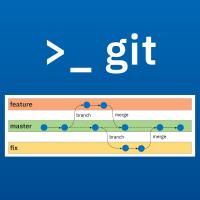
BEGINNER | Computer Science | Self-paced | 10 hours
Get started with Git and GitHub in this self-paced, introductory course! You’ll become familiar with collaborative version control and popular Git platforms. Collaboration and social coding are crucial parts of contemporary Software Engineering practices and the DevOps culture. You will begin this course with an overview of Git and Github fundamentals and explore key Git concepts such as branching and repositories, as well as the use of Git commands. You will also learn and practice various Git concepts such as forking, cloning and merging workflows using hands-on labs. And you’ll learn to use GitHub to work effectively as a team, and perform common Git operations, from both the Web UI and command line. The course wraps up with a final project where you will start building your portfolio by creating and sharing a public/open-source GitHub project. By completing this course you will demonstrate your Git and Github skills as well as add a project to your resume! All hands-on activities in this course can be performed using web-browser based tools and interfaces. Installation of any specialized software is NOT required on your own computer in order to complete the course.
INTERMEDIATE | Computer Science | Self-paced | 15 hours
Learn one of the most popular front-end frameworks, JavaScript React, in this hands-on course. Take the next step in your web development journey by learning how to build client-side user interfaces. You will develop these front-ends using components, the modular building blocks of React applications. You will learn about component composition to create rich functionality with features such as props, hooks, states, and event handling. You will explore component lifecycles and how to pass data and manipulate component states. Build your portfolio and gain practical experience by completing numerous hands-on labs in each lesson. At the end of the course, you integrate your skills with a final project by developing a shopping cart application. This course will help you succeed as a front-end, mobile or full-stack developer. It suits IT professionals looking to step up their careers or new graduates seeking to establish their client-side skills. Note that you will need basic HTML, CSS, JavaScript, and Git skills to get the most out of this course.
INTERMEDIATE | Computer Science | Self-paced | 13 hours
In a recent Stack Overflow survey, Node.js was used by about 50% of the developers who answered the survey, making it the most used server-side technology. Express ranked as the fourth most popular web technology overall, making it the most popular server-side web framework. In this course, you will focus on Node.js and Express. Specifically, you will - develop applications using asynchronous callbacks and promises - create REST APIs and perform CRUD operations - implement authentication and session management Throughout the course, you will complete numerous hands-on labs to gain practical experience. At the end of the course, you will demonstrate your Node skills with a final project to build your portfolio. This course will help you succeed as a back-end or full-stack developer. It suits those in IT looking to step up in their careers or new graduates seeking to establish their server-side skills. This course suits those who need to manage cloud-centric projects. Note: This course requires knowledge of JavaScript and Git.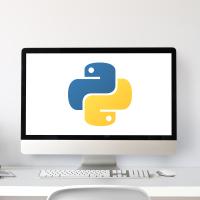
BEGINNER | Data Science | Self-paced | 25 hours
Kickstart your learning of Python with this beginner-friendly self-paced course taught by an expert. Python is one of the most popular languages in the programming and data science world and demand for individuals who have the ability to apply Python has never been higher. This introduction to Python course will take you from zero to programming in Python in a matter of hours—no prior programming experience necessary! You will learn about Python basics and the different data types. You will familiarize yourself with Python Data structures like List and Tuples, as well as logic concepts like conditions and branching. You will use Python libraries such as Pandas, Numpy & Beautiful Soup. You’ll also use Python to perform tasks such as data collection and web scraping with APIs. You will practice and apply what you learn through hands-on labs using Jupyter Notebooks. By the end of this course, you’ll feel comfortable creating basic programs, working with data, and automating real-world tasks using Python. This course is suitable for anyone who wants to learn Data Science, Data Analytics, Software Development, Data Engineering, AI, and DevOps as well as a number of other job roles.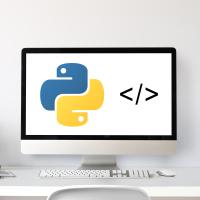
INTERMEDIATE | Computer Science | Self-paced | 11 hours
This mini course is intended to apply basic Python skills for developing Artificial Intelligence (AI) enabled applications. In this hands-on project you will assume the role of a developer and perform tasks including: - Develop functions and application logic - Exchange data using Watson AI libraries - Write unit tests, and - Package the application for distribution. You will demonstrate your foundational Python skills by employing different techniques to develop web applications and AI powered solutions. After completing this course, you will have added another project to your portfolio and gained the confidence to begin developing AI enabled applications using Python and Flask, Watson AI libraries, build and run unit tests, and package the application for distribution out in the real world.
INTERMEDIATE | Information Technology | Self-paced | 14 hours
Working with databases is a key skill for developers, especially those in Back-End, Full Stack, and DevOps roles. This course will teach you the fundamentals of relational databases and how to access them from your applications. Some of the essential application development tasks include accessing, processing, and presenting data. Data is stored in various databases, either on-premise or on the cloud, and developers will need to learn how to talk to them via programming languages. In this course, you’ll learn about foundational database concepts, and basics of SQL, a simple and powerful programming language used for managing data. In addition to SQL, you will discover how Object-Relational Mapping (ORM) allows you to use Object-Oriented Programming (OOP) languages like Python to work with databases. You will gain full-stack Django skills by creating a Django web app to persist, process, and present data. And you will get hands-on experience deploying your Django web app on the cloud. Throughout this course you will practice with hands-on labs. You will also complete a final project at the end of the course to demonstrate what you have learnt and have a great addition to your portfolio!
INTERMEDIATE | Information Technology | Self-paced | 18 hours
Take the next step in your software engineering career by getting skilled in container tools and technologies! The average salary for jobs that require container skills is $137,000 in the US according to salary.com, making Devops professionals and developers with these skills highly in demand. More than 70 percent of Fortune 100 companies are running containerized applications. But why? Using containerization, organizations can move applications quickly and seamlessly among desktop, on-premises, and cloud platforms. In this beginner course on containers, learn how to build cloud native applications using current containerization tools and technologies such as Docker, container registries, Kubernetes, Red Hat, OpenShift, and Istio. Also learn how to deploy and scale your applications in any public, private, or hybrid cloud. By taking this course you will familiarize yourself with: - Docker objects, Dockerfile commands, container image naming, Docker networking, storage, and plugins - Kubernetes command line interface (CLI), or “kubectl” to manipulate objects, manage workloads in a Kubernetes cluster, and apply basic kubectl commands - ReplicaSets, autoscaling, rolling updates, ConfigMaps, Secrets, and service bindings - The similarities and differences between OpenShift and Kubernetes Each week, you will apply what you learn in hands-on, browser-based labs. By the end of the course, you’ll be able to build a container image, then deploy and scale your container. The skills taught in this course are essential to anyone in the fields of software development, back-end & full-stack development, cloud architects, cloud system engineers, devops practitioners, site reliability engineers (SRE), cloud networking specialists and many other roles.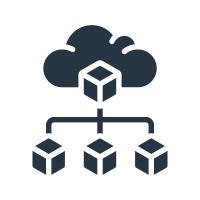
INTERMEDIATE | Computer Science | Self-paced | 15 hours
Welcome to this introductory course on microservices and serverless, essential technologies for cloud native and application modernization workloads. Rather than building large applications, known as monoliths, that perform all the functionality, microservices break down larger applications into smaller pieces that are independently maintainable and scalable, providing a host of benefits. This architecture is now used in the largest software organizations in the world, because it provides cost benefits, team autonomy, and other advantages. Likewise, serverless has emerged as an increasingly popular compute option in the cloud era. Giving developers and operators the ability to run applications without managing underlying infrastructure. In this course, you will create microservices using various methodologies. You will create REST APIs using Python and Flask. Next, you will learn the basics of Serverless applications, and how to run your applications on the IBM Cloud Code Engine. The course contains several hands-on labs which allow you to practice and apply the content you learn in the course. In the final project, you will create a front-end application composed of several microservices and deploy them on the Cloud using serverless.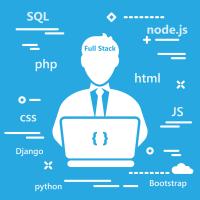
ADVANCED | Computer Science | Self-paced | 17 hours
Show your mastery of full stack application development by completing this capstone project! In this course, you will apply your knowledge and skills to a real-life inspired challenge and use your expertise to develop a successful solution. The project provides you with an opportunity to solidify your full stack proficiency. As you design a dynamic user experience, you will develop frontend pages, add user administration, build actions for database operations, create backend services, and configure CI/CD pipelines. You will boost your capabilities with HTML, CSS, JavaScript, Django, React, Node js and NoSQL (Mongo), Containerization, IBM Code Engine, Python, and Kubernetes. Then you will devise a solution for managing the containerized deployment of your application. This project is created for you to apply knowledge of relevant and in-demand skills such as: - Designing applications and their architecture - Creating web frontends with static and dynamic pages using HTML, CSS, JavaScript and REACT - Implementing user management and authentication - Developing backend services and communicating with databases - Continuously Integrating and Deploying changes using CI/CD pipelines - Deploying serverless applications on Code Engine - Creating and invoking RESTful microservices - Deploying the entire solution on Cloud using Kubernetes When you complete this project, you will have a working Full Stack application showpiece that will impress potential employers. Before completing this project, it is highly recommended that you complete all the prior courses offered in the IBM Full Stack Software Developer Professional Certificate.
INTERMEDIATE | Computer Science | Self-paced | 7 hours
This is the final course in the IBM Full Stack Software Developer Professional Certificate. It will test your knowledge and the skills you’ve acquired so far. This course contains the graded final examination covering content from various courses in the PC. You will be assessed on topics such as core cloud computing concepts; languages like HTML, CSS, JavaScript, and Python; frameworks such as Node.js, Express, and React; and back-end technologies such as Docker, Kubernetes, OpenShift, SQL, Django, Microservices, and Serverless. Prior to taking this course, please ensure you have completed all previous courses in the IBM Full Stack Software Developer PC.
INTERMEDIATE | Information Technology | Self-paced | 17 hours
Generative AI is transforming the field of Software Engineering, making it a crucial skills for Developers to have in their toolkit. This IBM course "Generative AI for Software Developers" is designed to provide you with a comprehensive understanding of how generative AI techniques can be applied to enhance software development processes. This course is designed to offer the necessary skills and knowledge needed to leverage AI-powered tools and algorithms to improve the efficiency of software development processes. Through a combination of videos, hands-on exercises, demos, and projects, you will learn how to leverage generative AI models to automate various aspects of software development, including code generation, design and architectures, bug detection, and optimization. This course will also help you understand the ethical considerations that you should follow to use AI to its full potential. Enroll today to get the most out of AI for developing software and boost your career!
BEGINNER | Information Technology | Self-paced | 11 hours
Software engineering professionals are in high demand around the world, and the trend shows no sign of slowing. There are lots of great jobs available, but lots of great candidates too. How can you get the edge in such a competitive field? This course will prepare you to enter the job market as a great candidate for a software engineering position. It provides practical techniques for creating essential job-seeking materials such as a resume and a portfolio, as well as auxiliary tools like a cover letter and an elevator pitch. You will learn how to find and assess prospective job positions, apply to them, and lay the groundwork for interviewing. The course doesn’t stop there, however. You will also get inside tips and steps you can use to perform professionally and effectively at interviews. You will learn how to approach a code challenge and get to practice completing them. Additionally, it provides information about the regular functions and tasks of software engineers, as well as the opportunities of the profession and some options for career development. You will get guidance from a number of experts in the software industry through the course. They will discuss their own career paths and talk about what they have learned about networking, interviewing, solving coding problems, and fielding other questions you may encounter as a candidate. Let seasoned software development professionals share their experience to help you get ahead and land the job you want. This course will prepare learners for roles with a variety of titles, including Software Engineer, Software Developer, Application Developer, Full Stack Developer, Front-End Developer, Back-End Developer, DevOps Engineer, and Mobile App Developer.Complete This Certificate. Get College Credit.
You know that skill-specific courses will open the door to specialized jobs, but did you know that they will also move you closer to a degree at Franklin University?
The University has evaluated hundreds of certifications for industry-recognized proficiencies and awards credit that equates to specific Franklin courses, as well as technical- or elective-credit requirements. See how much time and money you'll save toward your degree by building on prior learning credit.
Browse & Filter

Bolster Your Professional Skills
Take back control or rethink your career by strengthening your skills with a Professional Certificate through Franklin. Learn, hone or master job-related skills with professional development classes that won't break the bank or gobble up your free time. These online courses let you feed your curiosity and develop new skills that have real value in the workplace. Learn at your own pace. Cancel your subscription anytime.

Showcase Your Capabilities
Through Franklin’s partnership with Coursera, Certificate courses let you apply your learnings and build a career portfolio that helps demonstrate your professional capabilities to employers. Whether you're moving into a new field or progressing in your current one, the hands-on projects offer real-world examples that help illustrate your skills and abilities. Project completion is required to earn your Certificate.

Gain a Competitive Advantage
Get noticed by hiring managers and by your network of professional connections when you add a Professional Certificate to your credentials. Many Certificates are step toward full certification while others are the start of a new career journey. At Franklin, your Certificate also may be evaluated for course credit if you decide to enroll in one of our many degree programs.
Frequently Asked Questions
When you enroll in this self-paced certificate program, you decide how quickly you want to complete each of the courses in the specialization. To access the courses, you pay a small monthly cost of $35, so the total cost of your Professional Certificate depends on you. Plus, you can take a break or cancel your subscription anytime.
It takes an average of 3-4 months to complete the courses and hands-on projects to earn your certificate.
This intermediate-level series is for aspiring app developers with or without a degree who have a basic understanding of running commands, taking screenshots and working with files and folders in an OS.
Completing this certificate course means you've added essential skills to your career credentials, demonstrating excellence with Cloud technologies that can qualify you for an entry-level role as an app developer.
No. Courses offered through the Marketplace are for all learners. There is no application or admission process.
Please submit your certificate to plc@franklin.edu for review and processing. After your official evaluation has been completed, please review it to ensure that all eligible credits have been applied.
You can submit documentation before or after you apply to Franklin.